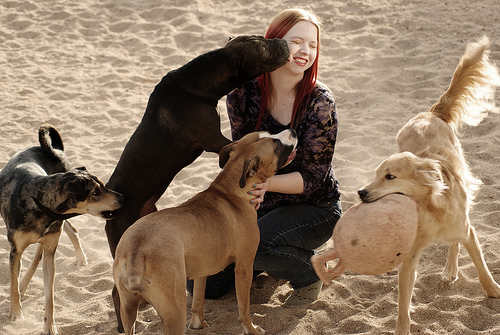
Dogs are social animals by nature but you might need to learn how to get your dog to socialise.
Dogs have to learn how to interact with other animals through socialisation. Ideally, this will happen as a puppy as they are likely to become suspicious of environments to which they have not already been introduced to. Socialisation is therefore a key part of your dog’s development.
While it’s preferable for this to take place as a puppy, adopted dogs that have not previously been socialised while they were very young can potentially still be trained for this as an adult. This is a lot more difficult compared to socialising a young puppy but it can be done.
For dogs that have already been fully socialised, it is good practice to continue this process as your pet gets older. Dogs who were only socialised as puppies can sometimes develop aggression and other behavioural issues during interactions with other animals, especially if these encounters do not happen on a regular basis.
Here are our tips for encouraging your dog to interact with other dogs.
What is Socialisation?
Socialisation will help your dog to make sense of the world, particularly with regards to responding to situations in a healthy way. Your dog is exposed to a range of animals and people so that they understand the ‘right’ way to react. Generally speaking, this makes them friendlier, happier and easier to handle than their non-socialised counterparts.
Tips for Encouraging Puppies to Socialise
- Most puppies will begin their socialisation at basic classes, and this will often be the full extent of their training. This is a must before your pet goes out to meet other dogs.
- Puppies are naturally inquisitive, which makes it easier to introduce them to new experiences compared to when they are older.
- Offering treats when meeting new dogs can help to build a positive association in your puppy’s mind.
Tips for Persuading Older Dogs to Socialise
- It’s usually too late to change an adult dog’s feelings towards other animals but you can have success in altering their behaviour towards them instead. This involves teaching them to be calm and relaxed in the presence of other dogs.
- Make sure that your dog has plenty of opportunities to meet both people and animals. Trips to the park can work well, for example.
- Your dog doesn’t need to respond or react to other dogs in the beginning. Instead, teach and reward them to behave calmly while there are other dogs in the vicinity.
- Encourage introductions and interactions on neutral ground so that neither dog is likely to act aggressively in defending ‘their’ territory.
- Obedience classes will help to socialise your dog on how to behave before these encounters.
Continuing Your Dog’s Ongoing Socialisation
Many dogs will not continue to be socialised beyond their puppy socialisation and this can potentially lead to behavioural problems further down the line – especially if their exposure to other dogs reduces. Their attitude and behaviour towards other animals can change as they get older, if they have not been continually socialised.
[Photo Credit: freeparking 😐]